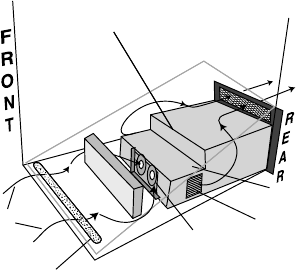
7
longer than two seconds, and off for at least one second. If either
LED remains on for longer than three seconds, that channel is
hard limiting with these negative consequences:
• Increasing the input level will not increase the vol-
ume.
• The system distorts due to clipping and nonlinear driver
operation.
• Unequal limiting between the low and high frequency
drivers alters the frequency response.
• Driver and amplifier life-span is reduced because they
are subjected to excessive heat.
NOTE: Although the TPL limiters exhibit smooth sonic char-
acteristics, we do not recommend using them for intentional
compression effects. Use an outboard compressor/limiter to
compress a mixed signal.
The TPL LEDS can indicate an imbalance in a configuration of
loudspeakers by functioning like a spectrum analyzer. If the
loudspeakers in a subwoofer, mid-bass, or mid-hi subsystem
begin to limit before reaching the required operating level for
the entire system, then that subsystem needs to be supplemented
with additional loudspeakers.
Fans and Cooling System
The MSL-4 uses a forced-air cooling system with two fans to
prevent the amplifiers from overheating. The fans draw air in
through ducts on the front of the cabinet, over the heatsinks, and
out the rear of the cabinet. Since dust does not accumulate in
the amplifier circuitry, its life-span is increased significantly.
A foam insert filter, in combination with the entire front grill
surface, acts as an air filter for the cooling system. Despite the
filtering, extensive use or a dusty operating environment can al-
low dust to accumulate along the path of the airflow, preventing
normal cooling. We recommend periodically removing the
grill, filter, and amplifier module and using compressed air to
clear dust from the grill, filter, fans, and heatsinks. Make sure
that the air ducts are clear and that there is at least six inches
clearance for exhaust behind the cabinet.
air
intake
power supply
air filter
heatsinks
amplifier
cooling
fans
A variable-speed primary fan runs continuously with an inaudible
operating noise of 22dBA at 1 m at its slowest speed. The speed
of the primary fan begins increasing when the temperature
of the heatsinks reaches 42°C. The fan reaches full speed at
62°C and is barely audible near the cabinet, even without an
audio signal.
In the unusual event that the heatsink temperature reaches 74°C,
the secondary fan turns on; it turns off when the temperature
decreases to 68°C. The secondary fan is audible at close prox-
imity without an audio signal and turns on in response to
• primary fan failure (check its status immediately);
• a prolonged period of high source levels in hot tempera-
tures or direct sunlight;
• accumulation of dust in the cooling system path;
• driver failure.
TROUBLESHOOTING NOTE: In the highly unlikely event
that the secondary fan does not keep the temperature below
85°C, the MSL-4 automatically shuts down until AC power is
removed and reapplied. If the MSL-4 shuts down again after
cooling and reapplying AC power, contact Meyer Sound for
repair information.
